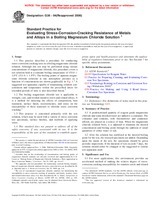Potrebujeme váš súhlas na využitie jednotlivých dát, aby sa vám okrem iného mohli ukazovať informácie týkajúce sa vašich záujmov. Súhlas udelíte kliknutím na tlačidlo „OK“.
ASTM G36-94(2006)
Standard Practice for Evaluating Stress-Corrosion-Cracking Resistance of Metals and Alloys in a Boiling Magnesium Chloride Solution
Automaticky preložený názov:
Štandardná prax pre hodnotenie Stress - korózii odolnosť proti korózii kovov a zliatin v Boiling horčíka roztoku chloridu
NORMA vydaná dňa 1.11.2006
Informácie o norme:
Označenie normy: ASTM G36-94(2006)
Poznámka: NEPLATNÁ
Dátum vydania normy: 1.11.2006
Kód tovaru: NS-57657
Počet strán: 6
Približná hmotnosť: 18 g (0.04 libier)
Krajina: Americká technická norma
Kategória: Technické normy ASTM
Anotácia textu normy ASTM G36-94(2006) :
Keywords:
accelerated test, apparatus, boiling magnesium chloride, glassware, nickel containing alloy, stainless steels, stress-corrosion cracking, ICS Number Code 77.060 (Corrosion of metals)
Doplňujúce informácie
| Significance and Use | ||||||||
|
For most applications, this environment provides an accelerated method of ranking the relative degree of stress-corrosion cracking susceptibility for stainless steels and related alloys in aqueous chloride-containing environments. Materials that normally provide acceptable resistance in hot chloride service may crack in this test. The test may not be relevant to stress-corrosion cracking in polythionic acid or caustic environments. Resistance to stress-corrosion cracking in boiling magnesium chloride (155.0°C (311.0°F)) should, where possible, be correlated to resistance in service for the materials of interest. However, such correlations may not always be possible. Boiling magnesium chloride may also cause pitting of many stainless alloys. This leads to the possibility of confusing stress-corrosion failures with mechanical failures induced by corrosion-reduced net cross sections. This danger is particularly great when small cross section samples, high applied stress levels, long exposure periods, stress-corrosion resistant alloys, or a combination thereof are being used. Careful examination is recommended for correct diagnosis of the cause of failure. |
||||||||
| 1. Scope | ||||||||
|
1.1 This practice describes a procedure for conducting stress-corrosion cracking tests in a boiling magnesium chloride solution. Although this test may be performed using various concentrations of magnesium chloride, this procedure covers a test solution held at a constant boiling temperature of 155.0 1.0°C (311.0 1.8°F). The boiling points of aqueous magnesium chloride solutions at one atmosphere pressure as a function of concentration are shown graphically in Fig. 1. A suggested test apparatus capable of maintaining solution concentration and temperature within the prescribed limits for extended periods of time is also described herein. 1.2 The boiling magnesium chloride test is applicable to wrought, cast, and welded stainless steels and related alloys. It is a method for detecting the effects of composition, heat treatment, surface finish, microstructure, and stress on the susceptibility of these materials to chloride stress corrosion cracking. 1.3 This practice is concerned primarily with the test solution, which may be used with a variety of stress corrosion test specimens, surface finishes, and methods of applying stress. This standard does not purport to address all of the safety concerns, if any, associated with its use. It is the responsibility of the user of this standard to establish appropriate safety and health practices and determine the applicability of regulatory limitations prior to use. See Section for specific safety precautions. |
||||||||
| 2. Referenced Documents | ||||||||
|
Odporúčame:
Aktualizácia technických noriem
Chcete mať istotu, že používate len platné technické normy?
Ponúkame Vám riešenie, ktoré Vám zaistí mesačný prehľad o aktuálnosti noriem, ktoré používate.
Chcete vedieť viac informácií ? Pozrite sa na túto stránku.




 Cookies
Cookies
